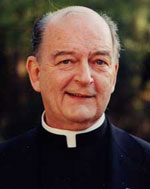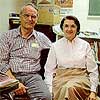
|
||
|
||
|
Thursday, January 08, 2009
Richard John Neuhaus, 1936-2009
 From Jody Bottum: From Jody Bottum:Fr. Richard John Neuhaus slipped away today, January 8, shortly before 10 o’clock, at the age of seventy-two. He never recovered from the weakness that sent him to the hospital the day after Christmas, caused by a series of side effects from the cancer he was suffering. He lost consciousness Tuesday evening after a collapse in his heart rate, and the next day, in the company of friends, he died. Funeral Arrangements A Funeral Mass will be celebrated for Father Richard John Neuhaus at the Church of the Immaculate Conception—414 E. 14th Street, New York City—on Tuesday, January 13, 2009, at 10 a.m.
“When I come before the judgment throne, I will plead the promise of God in the shed blood of Jesus Christ. I will not plead any work that I have done, although I will thank God that he has enabled me to do some good. I will plead no merits other than the merits of Christ, knowing that the merits of Mary and the saints are all from him; and for their company, their example, and their prayers throughout my earthly life I will give everlasting thanks. I will not plead that I had faith, for sometimes I was unsure of my faith, and in any event that would be to turn faith into a meritorious work of my won. I will not plead that I held the correct understanding of “justification by faith alone,” although I will thank God that he led me to know ever more fully the great truth that much misunderstood formulation was intended to protect. Whatever little growth in holiness I have experienced, whatever strength I have received from the company of the saints, whatever understanding I have attained of God and his ways - these and all other gifts received I will bring gratefully to the throne. But in seeking entry to that heavenly kingdom, I will…look to Christ and Christ alone.”
Richard John Neuhaus. Death on a Friday Afternoon Notices
Reflections
The story of the modern social conservative movement is all about activism and politics, petitions and court cases, but Father Neuhaus’s great testament was about something grander: through those he inspired, through his writings, through his organizing, and through something as simple as connecting people over lunch who may share nothing in terms of what they can eat on the table but share greatly in what is unseen, Father Neuhaus fundamentally changed religious life in America forever.-- From Ben Domenech, RedState.com His conviction that abortion was the great crime of the age and his disgust with the American system’s failure to expunge the crime led to the most controversial act of his editorship, the publication of a symposium entitled “The End of Democracy?” in which he and other participants flirted with the notion that the United States had lost its legitimacy. COMMENTARY’s editors responded in part with a symposium entitled “On the Future of Conservatism,” in which various contributors argued heatedly against what they perceived to be an unacceptable radicalization of conservative discourse.John Podhoretz, Commentary Magazine For more tributes and articles on Fr. Neuhaus, see Richard John Neuhaus Online Archive. Labels: richard neuhaus
Tuesday, August 19, 2003
The Zwicks vs. Fr. Neuhaus & Michael Novak
 Being a regular subscriber to The Catholic Worker since college, I'm very much acquainted with that particular faction of Catholics and their understanding of economic affairs. Having likewise subscribed to First Things for some time, I have of late familiarized myself with the perspectives of Fr. Neuhaus and the Catholic philosopher & economist Michael Novak. However, I confess that I've never fully studied the Church's thought on these matters, which is something I hope to remedy. Being a regular subscriber to The Catholic Worker since college, I'm very much acquainted with that particular faction of Catholics and their understanding of economic affairs. Having likewise subscribed to First Things for some time, I have of late familiarized myself with the perspectives of Fr. Neuhaus and the Catholic philosopher & economist Michael Novak. However, I confess that I've never fully studied the Church's thought on these matters, which is something I hope to remedy.
With that end in mind, one of the books I've been reading is Michael Novak's The Catholic Ethic & the Spirit of Capitalism, which is in many ways a revision of his earlier work The Spirit of Democratic Capitalism. I'm only halfway through and not at a point where I can provide a substantial review, but it has prompted me to go back and evaluate some of the earlier criticisms of Neuhaus and Novak I encountered in the pages of the Houston Catholic Worker, particularly by Mark & Louise Zwick. There is something about the way the Zwicks go after these authors (the "neoconservatives") in the pages of their newspaper that really gets under my skin. Take, for example, their scathing review of Fr. Neuhaus' book Appointment in Rome, charging that his advocacy of "neoconservative economics" (what they commonly refer to as "neoliberalism") "presents a view shockingly different from that of the Holy Father" in the apostolic exhortation Ecclesia in America. 1
Personally I find that the Zwick's patience in waiting for Fr. Neuhaus' conversion to Catholicism "to take" a little condescending. After all, Neuhaus was ordained a Catholic priest nearly a decade before this review was written. And those who are familiar with his writings, or have encountered him in person, would hardly recognize him in the Zwick's criticism that he "missed the point" of the Synod due to his callous "neglect of the poor." In reviewing Novak's book, the Zwicks forego direct citation and rely on crude paraphrasing. Thus Fr. Neuhaus "endorses an economic system where the vast majority, especially in Latin America, are not free at all. Factories of U. S. companies in Latin America pay slave wages." The same goes for his cohort, Michael Novak, who "has stated that it is sinful for those who work for slave wages to complain about this disparity in salaries, since the sin of envy was condemned in the book of Deuteronomy", and that "Fr. Avery Dulles, S.J., defends slave wages as being better than no wages." For the Zwicks, to favor freedom, capitalism and moral responsibility over socialism and liberation theology inevitably makes one a supporter of not only unjust wages but torture and execution. Neuhaus "recommends the U.S. economic system as one of fairness and freedom to the Bishops, without admitting that the School of the Americas, where so many Latin American soldiers were trained to torture and kill their people, is an integral part of that system." Neuhaus' alleged support of slave wages and Latin American death squads is compounded by the fact that he "suggests that their economic problems might be blamed on the Latin American Catholic Church because of its lack of Calvinism." Ultimately, those not inclined to investigate the writings of Fr. Neuhaus beyond the pages of the Catholic Worker will conclude, along with the Zwicks, that he (and Novak, and Dulles, et al.) wholeheartedly endorses a violent political philosophy which "mows down people who are in other countries through maquiladoras, slave wages, international trade agreements and torture taught at the School of the Americas to ensure that "freedom" prevails." The Catholic political philosopher Michael Novak is also a frequent target of the Catholic Worker. When he was invited to dedicate a local Catholic business ethis program at a local Catholic University, the Houston Catholic Worker likened the action to "inviting Hugh Hefner to dedicate an institute on the sacrament of marriage", describing Novak's vast body of writing as "window dressing to promote an economic system based solely on self-interest." 3 The former comment was made by a fellow Catholic Worker, and was thought to be "uncharitable" by his colleague. However, according to the Zwicks, ". . . the reality in our world obligated us to speak in truth and solidarity with the cry of the millions of poor people who suffer so much from neoconservative/neoliberal policies" -- as if "speaking in truth and solidarity" necessitated such ridicule! In October 2002 the columnist Peggy Noonan recommended Novak's Spirit of Democratic Capitalism as an antidote to the selfishness which characterized the businessmen involved in the recent corporate scandals. According to Ms. Noonan:
Shortly thereafter the Zwicks published an editorial responding to Ms. Noonan's endorsement of Michael Novak. Again, they chose to exercise their right to "speak in truth and solidarity with the cry of millions":
In their editorial the Zwicks ask "Did Peggy Noonan read Novak's books?" One might ask the same of the Zwicks. In fact, on one occasion Novak was moved to tell them: "I enjoyed serving several times in various articles as an evil presence in the world of your imagination . . . I enjoyed it because you have created a straw man", recommending several of his books to them and offering to provide them himself. The Zwicks published his letter with a lengthy response, in which they praise ("we have read several of your books in that beautiful romantic prose"), chastise ("for you to quote the Pope in favor of your form of capitalism bears resemblance to the devil quoting Scripture") and finally invite him ("As a fellow Catholic who partakes of the same Eucharist") to assist them in developing a new economic model. 6 Clearly the Zwicks differ sharply in their interpretation of Novak's thought. I can only wonder how the Zwick's can square their characterization of Novak as an apologist for "Enron Capitalism" with his contension (along with Pope John Paul II) that
Fr. Neuhaus also responded to the Zwicks in his column in First Things, noting that "The Catholic Worker seems to be of the view that the authentically Catholic position is one of being in love with being in love with the poor and the suffering. The course of love, I would suggest in agreement with Catholic doctrine, is to do all we can to remedy poverty and suffering productivity and exchange". He concluded:
I do respect Mark & Louise Zwick: it is truly inspiring to see a couple devote their daily lives to the Works of Mercy and assisting the least among us. Nevertheless, one would think that their efforts to embody a new economic model distinguished by "cooperation and sharing between rich and poor" would be assisted by genuine dialogue with those they disagree with -- and to the extent that they misrepresent the thought and character of Fr. Neuhaus and Michael Novak, their manner of writing strikes me as inevitably counter-productive. A blog is not a suitable vehicle to go into a lengthy, detailed examination and point-by-point rebuttal of the Zwick's charges -- nor do I think I'm especially knowledgable or competent enough in this area to do so. However, I have read enough to believe that anyone who confines themselves to the Zwick's assessment of Novak & Neuhaus in the Houston Catholic Worker is sorely deprived. 9
Labels: catholic social teaching, michael novak, richard neuhaus
|

Against The Grain is the personal blog of Christopher Blosser - web designer
and all around maintenance guy for the original Cardinal Ratzinger Fan Club (Now Pope Benedict XVI).
Blogroll
Religiously-Oriented
"Secular"
|
|













